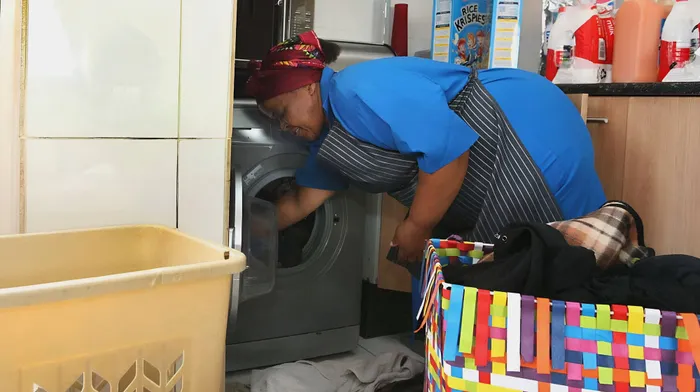Seven days of work, still hungry: The harsh reality lives of South Africa’s domestic workers

The state of the domestic work sector is a reflection of our society’s values, says the author.
Image: File picture: Simphiwe Mbokazi / Independent Newspapers
The city is still dark when her alarm sounds, a faint digital chime cutting through the quiet as her children sleep. Her day begins long before sunrise: a walk to the taxi rank, a crowded minibus ride, and the slow crawl through Johannesburg’s traffic. From her seat, she watches two worlds pass by: the one she leaves behind, where survival is a daily struggle, and the one she travels to, where high walls and manicured lawns signal comfort and security.
During this journey, her mind is a ledger. The school fees are due next week. The price of maize meal is up again. Her mother’s clinic appointment cannot be missed. She mentally subtracts these costs from the R3,635 she earns each month, knowing that the true cost of keeping her family afloat is closer to R4,500. The gap between have and need hangs in the air, a silent passenger on her daily commute. It is a weight she carries long before she picks up a broom or scrubs a floor.
When she arrives at the gate, she takes a breath and steps into that other world. Here, her purpose is clear: to bring order, to create a space of peace and cleanliness for another family. And in this work, she finds a profound sense of pride. “To me it's a calling,” she might say, reflecting the thoughts of a worker from our latest survey. “I enjoy caring for the elderly and anyone who needs care”. This deep sense of purpose is the quiet, beating heart of a sector that provides stability to countless South African homes. Yet, it exists alongside a hidden reality of struggle and sacrifice that we can no longer afford to ignore.
Impossible budget
This mental ledger of an impossible budget is not an isolated story. Our 8th Annual Report confirms this struggle is systemic. When income cannot cover survival, debt becomes the only lifeline. “Being in debt is not easy when you are not earning well and you have mouths to feed, leading to depression,” another worker told us. Her story is shared by one in three of her colleagues, who are trapped in a cycle of borrowing that erodes both their finances and their well-being. For 35% of those in debt, the situation feels “hopeless”.
Many (82%) domestic workers are the primary breadwinners for their households, supporting an average of four dependents on this single income. Our data shows that 7% of domestic workers are on the job seven days a week, and a quarter of them face a one-way commute of over an hour just to get to work. Yet despite this dedication, a shocking 39% earn less than the National Minimum Wage. They are working constantly, yet the math of survival simply does not add up.
This constant financial pressure keeps domestic workers glued to a vulnerability that goes beyond budgets, keeping them in workplaces where their dignity is eroded. “There was a time that I doubted my ability to do work,” a respondent confessed, “because I was constantly told or shouted at, saying that I make childish mistakes and that I don't deserve the job”. This experience is tragically common, with our report finding that one in five domestic workers has faced abuse in the workplace.
The irony is that while facing these immense personal challenges, many of these workers are the pillars of other people's families. Often referred to as ‘second moms’, they play a pivotal role in how suburban children grow up, creating routines and shaping their view of the world. Yet, while they care for our children, many are forced to sacrifice time with their own.
Going beyond the transaction
As employers who welcome these workers into the intimacy of our homes, our responsibility must extend beyond a simple transaction. The comfort and stability we enjoy should not come at the cost of theirs. The findings in our report are not just statistics; they are a call for empathy and a challenge to a system that leaves the most vulnerable behind.
Meaningful change begins with acknowledging these hard truths and taking deliberate action. It starts with paying a living wage that closes the gap between earnings and basic costs. But it can go further. We can become a support structure for them, just as they are for us. This could mean contributing to a life insurance policy to safeguard their family’s future, or supporting their personal aspirations to further their education or build a home of their own.
The state of the domestic work sector is a reflection of our society’s values. For too long, we have accepted a status quo where the people who care for our homes cannot afford to build secure lives for themselves. We cannot allow the quiet comfort of our homes to be sustained by the quiet desperation of others. True progress is not measured by the peace within our own four walls, but by our contribution to an equitable society where the women who raise our children also have the time, resources, and peace of mind to raise their own.

Lourandi Kriel is the CEO of Sweepsouth.
Image: Supplied
Lourandi Kriel is the CEO of Sweepsouth
*** The views expressed here do not necessarily represent those of Independent Media or IOL.
BUSINESS REPORT